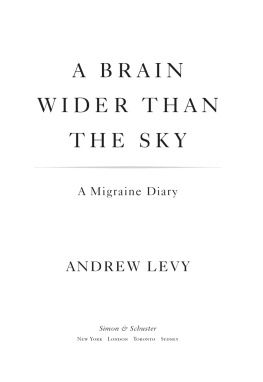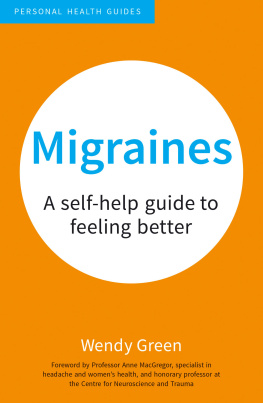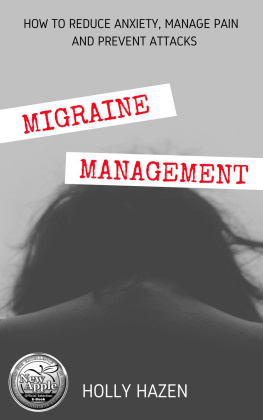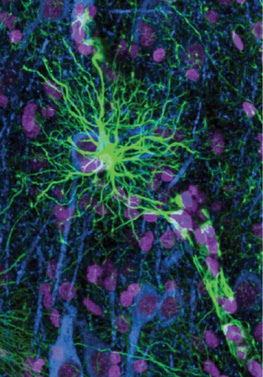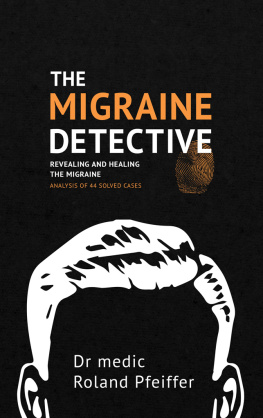All rights reserved, including the right to reproduce this book or portions thereof in any form whatsoever. For information address Simon & Schuster Subsidiary Rights Department, 1230 Avenue of the Americas, New York, NY 10020.
I Felt a Funeral, in My Brain reprinted with permission of the publishers and the Trustees of Amherst College from The Poems of Emily Dickinson, Ralph W. Franklin, ed., Cambridge, Mass.: The Belknap Press of Harvard University Press, Copyright 1951, 1955, 1979, 1983 by the President and Fellows of Harvard College.
SIMON & SCHUSTER and colophon are registered trademarks of Simon & Schuster, Inc.
Introduction: A Man with Patches on His Head
If a man, with patches on his head, is asked, what is the matter? He will answer, I had a headache the day before yesterday.
C HARLES D ARWIN , Voyage of the Beagle
September: there is no line between the migraine and worrying about the migraine as one lies awake at five in the morning. There is no difference between the first pinpricks of aura and the first gray rays of dawn, either, since one looks like the other, and since the latter seems to cause the former. This light sensitivity is mad. Its no real problem to have to wear sunglasses all morning, or to have to swivel the visor on the car as I turn northsouth to eastwest and the sun pivots crazily in the sky in response. But the way the soft, harmless grays of dawn can make my head pound is something else.
Ive been jolted awake by something; I cant tell if its worry or the early stages of a headache, but the anticipation of some future pain is so intense that sleep is now impossible. And, of course, sleeplessness such as this is an invitation to the headache. This cycle cannot be stopped. It is almost, I hate to say, interesting.
Take two: I am lying in my sons tiny bed, and my son is sleeping in my king-size bed somewhere alongside my wife. I know why this happens: I dont want to disturb them, and I dont want them to disturb me. But Im not completely sure how this happens: we switch beds semiconsciously, sometime in the rustling that precedes first light. Like any game, it makes its own logic.
I am watching the gray light slowly illuminate a bookshelf where his books and mine sit side-by-side. I am absolutely calm. The pain will come if it wants to come. I can feel the shuffling under my brow, the blood and the nerves meditating, a little rush, a little constriction. It almost feels as if theyre considering whether to make a commitment . I am absolutely calm. I can do an inventory of my body and my mind, feel the breath through my nose and mouth, feel the tingle down my arms, feel the slight tension where my ankles cross.
A few minutes pass, it seems. The shuffling underneath my brow continues, and the sky continues to lightenor, perhaps, my aura continues to enhance. But my confidence grows. I now admit to myself that my earlier calm was a kind of shock. I was so terrified that a headache was about to begin that I shut down. Maybe this is the nature of calm. But now I feel a kind of minor elation.
Then the first throb comes. Describe it: I do not like the word stab, because stabbing implies a process, an insertion. I really believe that if you could slow it down, you would find that it starts from a small center, and expands and contracts, like a balloon suddenly inflated and deflated. But some days I feel otherwise, and am amazed by how much it feels like it starts outside the head somewhere, in open space.
Describe it better: balloon could not be a worse simile. It starts from a point somewhere and pulsates, enlarges. By the third or fourth throb, a new pain appears, something after the throbs, like the afterimage on a television, a glow that grows fainter, until the next pulsation renews it. Theres a density now, a consistency. I get up, and while the rest of my body feels normal, my head feels as if it is shedding pieces as it rises, like the trail of a comet. It is hard to say if this hurts or not.
By the time I reach the kitchen, Ive got one goal: subdue the headache before Siobhn, my wife, and Aedan, our four-year-old, wake up. I dont want them to have to deal with this, with my complaint, my staggering, my inertness. And I dont want to have to deal with them, either, with their noise, their shuffling, their clacking of plates in the kitchen.
Ive got three options Ive been exploring: steam, tea, ice pack. Ten minutes of steamthat wont get to the big block of pain, but it goes after the afterimages. Tea, as hot as it can get, can be pretty astounding: sometimes the headache lifts twenty minutes after. Its better than Vicodin, which leaves a haze and doesnt really work that well. Its better than Imitrex, which my GP has told me to stop taking for a while: its a tough little drug, but will actually give you migraines if you take too many (which you will do if you get too many migraines, of course). And the ice pack: the deep freeze, combined with absolute motionlessness, can create a deadened territory over the left eye and across the left temple, where its difficult to distinguish between the stinging of the cold and the frosted and subdued pulsations.
After trial, Ive learned to go ice first, then tea, then steam, in sequence from around 5:30 A.M. to 8 A.M. On this morning, Im lying on the sofa in the family room, three pillows triangled around my face, the ice pack with its three ridges pressed against my left temple, when Aedan walks in. I can hear the shoosh-shoosh of his too-long pajama bottoms sweeping the floor as he walks, the footfall of his steps, brisker than brisk even when hes sleepy. I can imagine his posture, that slight cantilevering, his head always getting someplace before his feet, his clear blue eyes, possibly, the brightest thing in the room.
And here is the very best and the very worst. From an early age, Aedan has understood that he had to negotiate with the headache, as if it were a third party. Once, when he was two, I was watching him alone when a bad headache struck, and I was double struck by the guilt of not being able to take care of him. I lay on the floor of his nursery, my head pressed against the carpet, hoping this would not be a time he needed me to be alert or active. And he discovered me that way, and wrapped his arms and legs around my head the way an octopus might embrace a rock on the ocean floor, all firmness and feral grace, catching the pressure points on my temple pretty well, not perfect, but pretty well.

